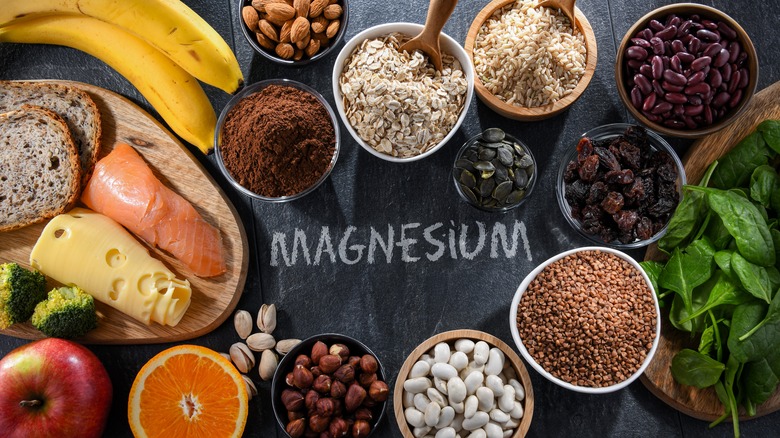A Neurologist Explains How To Prevent Migraines With Proper Nutrition
Migraines are complex, and the National Institute of Neurological Disorders and Stroke (NINDS) explains that they result from "neurological abnormalities caused by genetic mutations at work in the brain." Migraines are different for everyone, but most migraine pain is severe, and sometimes it can be unbearable, according to the American Migraine Foundation. Migraines differ from typical headaches because the person can be sensitive to light or sound, and the pain can last several hours or days. The pain also worsens when performing everyday activities.
Dr. Sara Crystal, Medical Director for Cove, a platform that combines diagnosis, personalized and affordable treatment solutions, and ongoing condition management for migraine sufferers, explains to Health Digest that many people suffer from migraines. "Migraine is a very common disorder — 12% of the overall U.S. population and 18% of women suffer from them," Dr. Crystal says. "It is about three times more common in women." She also says that about 25% of those who have migraines experience an aura, which can range from seeing flashing lights or weird geometric shapes to vertigo before or during a migraine. Luckily, Dr. Crystal divulges that proper nutrition can be a key step in preventing migraine attacks.
The effects of diet on migraines
Dr. Crystal states that your eating habits can affect how often migraines occur. "Skipping meals, eating certain foods, or even eating particular food additives and chemicals can trigger attacks, as can dehydration," she notes. "On the flip side, we know of several dietary interventions that can be helpful for migraine reduction."
One such change involves omega-3 fatty acids. "A recent study reported that a diet high in omega-3 fatty acids can help reduce migraine frequency," she explains, pointing out that for the study, the group that saw the greatest benefit increased their intake of dietary omega-3, and reduced their intake of omega-6 fatty acids. Foods that are rich in omega-3 include salmon, mackerel, and oysters. Dr. Crystal suggests that if you are unable to eat fish, consider taking a supplement. "Avoid foods that contain sunflower, corn, and soybean oils, which contain high levels of omega-6," she advises.
Common dietary triggers for migraines
Dr. Crystal explains that alcohol is a common trigger for migraines. She also named excessive caffeine intake as another frequent culprit. For those who might be sensitive to it, she suggests trying to limit caffeine to 200 mg of caffeine per day (1–2 cups of coffee). But that's not all. "Dairy products and processed foods can trigger attacks for some migraine sufferers," the doctor explains.
You may need to read labels to check for other offensive ingredients. Dr. Crystal says to be aware of foods that contain nitrates, which are "often found in deli meats and hot dogs." Tyramine is another additive that may lead to migraines. She explains that it "appears in red wine, aged cheeses, fermented or pickled food, and even overripe fruit." Aspartame, other artificial sweeteners, and monosodium glutamate are also known to be triggers in some people. "Specific ingredients that cause or contribute to head pain are different for everyone," Dr. Crystal says.
Migraines and nutritional deficiencies
Your migraines might also come down to a nutrient deficiency. "Magnesium deficiency is common in people with migraine, and has been linked to increased migraine frequency. Many people with migraine can benefit from taking a magnesium supplement, though speak with your doctor first if you have kidney problems," says Dr. Crystal. She says magnesium-rich foods include "whole grains, dark leafy vegetables, avocadoes, and certain nuts and seeds."
Another deficiency that might trigger migraines is vitamin D. Medical News Today reports that the vitamin is involved with many metabolic functions, which can be impacted if there isn't enough of the nutrient. In addition, vitamin D also helps the body absorb magnesium. Riboflavin, or vitamin B2, assists cell mitochondria in making energy, and some research links mitochondrial dysfunction with migraines. Coenzyme Q10 also helps mitochondria do their jobs, so those supplementing with it might see a reduction in migraine attacks.
Foods to help prevent migraines
In addition to adding the right supplements, you might experience fewer migraines if you eat more of the right kinds of foods, Dr. Crystal explains. She points out that the Physicians Committee for Responsible Medicine has "created a list of 'pain-safe foods' that 'virtually never contribute to headaches or other painful conditions,'" and they include "rice, cooked green vegetables, cooked orange vegetables, cooked yellow vegetables, [and] cooked or dried non-citrus fruits."
In addition, Dr. Crystal says the Association of Migraine Disorders has created a "more extensive list of 'migraine safe foods,' compiled of foods that do not contain preservatives, yeasts, flavorings, and other potentially triggering additives." Healthline notes that some migraine sufferers experience relief by going on the ketogenic diet, but to be careful as some keto foods can be migraine triggers, and to speak with a doctor first.
For more from Dr. Sara Crystal, visit the Cove website.





